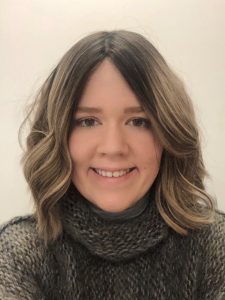 Research Assistant, Office of Interdisciplinary Programs and Outreach, Masters Candidate from the School of Social Work, David B. Falk College of Sport and Human Dynamics
Research Assistant, Office of Interdisciplinary Programs and Outreach, Masters Candidate from the School of Social Work, David B. Falk College of Sport and Human Dynamics
skorcz@syr.eduSarah is pursuing a Master of Social Work at Syracuse University; she is simultaneously pursuing a Certificate of Advanced Study in Disability Studies from the School of Education. Sarah is passionate about the application of social work theory to practice, policy, and research. Specifically, Sarah seeks an array of creative ways to incorporate critical disability theory into these arenas. As a Research Assistant in the Office of Interdisciplinary Programs and Outreach at the Burton Blatt Institute (Syracuse University College of Law), Sarah’s research focuses on strengthening linkages between social work practice and academic scholarship in disability studies. In her role as a nationally certified American Sign Language (ASL) Interpreter, Sarah’s work over the last several years has focused on advocating for and advancing the human rights of the Disability and d/Deaf communities she has served. She hopes to continue to work with the Disability community in her role as a social work practitioner in the future. Sarah’s interests include critical race feminism, social model theory, critical discourse analysis, ethnography, disability rights, and activism.
CURRENT PROJECTS & RESEARCH
Sarah and Professor Diane R. Wiener will be exploring how social work education teaches students an understanding of disability identity and culture. Sarah has collected over sixty journal articles, books, and other material about social work and disability. Sarah’s research with Prof. Wiener engages disability in relation to the social work curriculum, focusing in particular on the social model of disability, ableism, intersectionality, critical race feminist theory, and higher education.
According to Sarah’s findings, Disabled social work students often report a sense of “otherness” in their engagements with social work curriculum, faculty, and peers. Additionally, non-disabled social work students at times report that disability as a curricular theme causes feelings of discomfort; field education placement options centered on disability are often chosen last. Additionally, non-disabled social work students self-report their desire to develop practice skills that would assist in their professional development as social workers; the social workers-in-training seek to improve their engagement with disabled and non-disabled clients. In response to the experience of disabled social work students, Sarah and Diane will be creating programming that directly addresses the student experience.
Sarah and Diane have also developed a continuing education program for social work practitioners and educators that examines the role of disability in social work practice and education, approaching the work from a critical disability understanding. More specifically, the continuing education course seeks to engage social work educators and practitioners in shifting the perspective from social work’s medical model to promoting a disability rights perspective. Participants will learn how to create a more inclusive environment that supports student learning while applying the social model of disability to social work theory and practice. Furthermore, participants will learn strategies to explore their own experiences and feelings related to topics associated with disability in order to assist students and clients. Human rights will be advanced at the intersections of disability and many other axes of difference, including but not limited to, race, class, gender, sexual orientation, veteran status, ethnicity, and religious identity.
As part of their work together, Professor Wiener and Sarah are interested in collaborating with social work faculty at Syracuse University as well as other institutions of higher education. Sarah will be exploring how the medical model and the social model are being utilized in social work education at graduate and undergraduate levels. Although attempts have been made by social work educators to incorporate an array of approaches, the medical model still has primacy in social work curricula. An augmented understanding of disability, incorporating the social model and the history and current work of the disability rights movement (DRM), would support social work practitioners and faculty through the application of theory to practice, research, and policy, thereby influencing students, future practitioners, and scholars. We are interested in exploring from a sociocultural perspective how best to consider and incorporate advancing the human rights of the disability community within the field of social work. Everyone could benefit from a spectrum of approaches toward understanding disability—particularly, as a cultural or identity experience–as a matter of access, rights, civil liberties, human rights, and social justice.